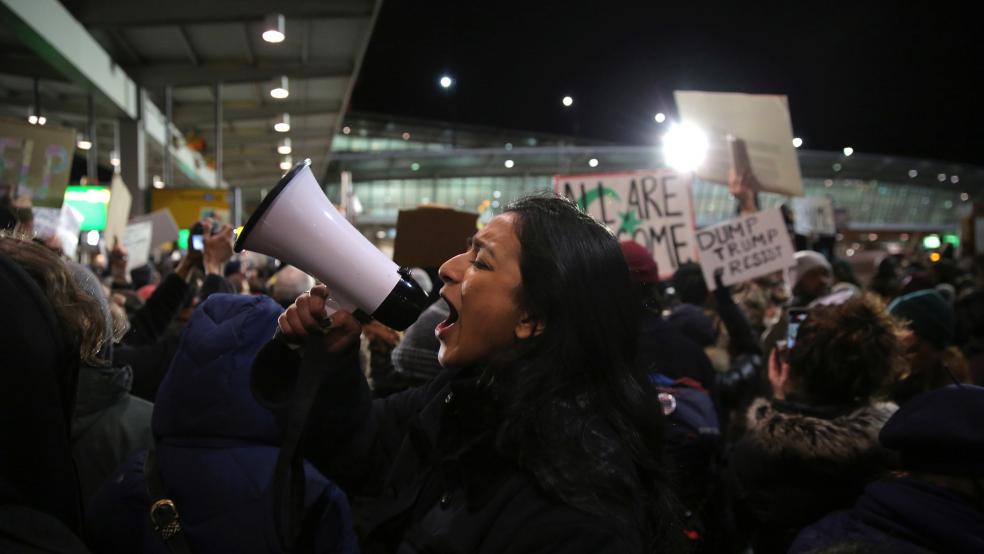In the whirlwind of activity punctuating the first week of the Trump administration, the sheer volume of new policies and pronouncements from the president and his staff made it difficult to focus on the larger picture. But by the end of the day Friday, when President Trump signed a ban on refugees entering the country, its embarrassingly chaotic rollout became the major story of the weekend.
As damaging as the ban might be to the United States’ standing in the Middle East and to Washington’s moral authority regarding the treatment of refugees, it masks the litany of executive orders issued by Trump this week that soured the relationship between this country and the rest of the world.
Related: Is This How Trump Plans to Take On China in Asia?
That’s not to say the disastrous executive order doesn’t deserve the attention. Trump’s plan not only bars all refugees from entering the country -- specifically singling out Syrians, who are undergoing one of the most horrific humanitarian disasters in recent memory -- but also blocks entry to the residents of seven entire countries, all majority Muslim.
And, in a move that seemed almost intended to promote the idea that the US is against Muslims in general, Trump also announced that one of the few exceptions to the refugee resettlement ban would be Christians living in majority Muslim countries.
By Saturday morning there were reports of legal permanent residents of the US -- some of them parents of children who are citizens -- being denied re-entry to the country they and their families call home. Refugees nearing the end of a clearance process that takes two years were sent back to the wretched camps where tens of thousands of them have lived for years.
By Saturday afternoon the retaliation began. Iran barred all US citizens from entering its country, meaning that Iranian Americans with family in the Islamic Republic will not be able to visit them.
Related: Here’s What the US Imports From Mexico – and Who Would Pay Trump’s 20% Tax
While that might seem like quite enough, the Trump administration did more than just antagonize half the Middle East in its first week in power. Trump’s newly-confirmed United Nations ambassador, former South Carolina governor Nikki Haley, announced her arrival at the international body with all the subtlety of a hand grenade.
“You’re going to see a change in the way we do business,” she said in brief remarks to the media. “Our goal with the administration is to show value at the U.N., and the way we’ll show value is to show our strength, show our voice, have the backs of our allies and make sure our allies have our back as well.”
“For those who don’t have our back,” she added ominously, “we’re taking names; we will make points to respond to that accordingly.”
Related: Trump Just Blew His Chance to Renegotiate NAFTA
Haley's warning followed the new president’s decision to start a Twitter fight with Mexican President Enrique Pena Nieto over the border wall that Trump insists he will build and force Mexico to pay for. Trump goaded Pena Nieto into canceling a meeting this week between the two men by claiming Mexico would pay for the wall.
Then Trump hit again. He sent his press secretary out to tell reporters he was planning to institute a 20 percent tariff on all goods imported from Mexico, sending the value of the country’s currency plunging.
In addition to threatening a trade war with the United States’ third-largest trading partner, Trump repeatedly insisted that he plans to reconsider US participation in a vast array of trade pacts, claiming it would be in the best interests of the US to negotiate bilaterally with every country in the world. His words left both markets and foreign leaders nervous about the future of global commerce.
Trump also hosted his first meeting with the leader of a major US ally when British Prime Minister Theresa May visited the White House. The Trump team misspelled May’s first name, conflating it with that of a British pornographic actress. During the joint press conference after they met, Trump again repeated his insistence that torture, which is outlawed by the US government and has been deemed ineffective by Trump’s newly confirmed Defense Secretary, General James Mattis, is an effective and legitimate means of extracting information from captured enemies.
Related: Mass Departures at the State Department as Trump Era Begins
By Saturday, it was almost possible to forget that earlier in the week Trump had suggested that the United States might get “another chance” to invade Iraq and take the country’s oil, and his claim that people who point out that this would be a war crime are “fools.”
The great danger here is that while Americans, faced with a blizzard of Trump coverage, may lose track of all the countries the new president has threatened, insulted, and bullied, those countries and their leaders surely won’t. And it will be at the top of their minds the next time an American diplomat asks for help or cooperation.





